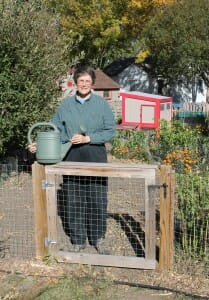An Urban Farmer’s Journal
A guest post by PFI member Helen Gunderson.
I hear the hum of the refrigerator and the noise of the fan above the stove.
I get a pot of sliced cucumbers and onions out of the refrigerator. The salt water brine has made the cucumbers bright green and the onions bright white. I think of all the time I spent slicing them.
There is a nostalgia to the work. I remember my grandmother, DeElda, and other neighborhood women who gardened.
I have become immersed, especially since moving to a large lot in Ames in 2006, in growing food and promoting the use of locally-grown produce. Although I derive great pleasure from preparing and eating food that I have grown, my greatest pleasure is in being able to connect with people through food whether for lunch on the back porch, a potluck dinner, or a meal at my church.
I like the solitude of working alone in my garden. I also enjoy gardening with other people. But in either case, it would be folly to invest so much time, energy, and money into producing so much food if it were only for me. It is neat when I am deciding what cucumber seeds to order in January, then planting them in June, and later harvesting and pickling them in July–to know that I can share the pickles.
A jar of bread and butter pickles seems like a symbol of an inner yearning, something virtuous and related to hospitality. And it’s a locavore thing. The cucumbers and onions are from my garden. They traveled zero miles from farm to the kitchen counter. No fossil fuels were burned. No packaging. No time to lose their freshness.
I am fortunate to have good topsoil and great sunlight. Fortunate to have the time and health to garden, people I can turn to for advice, good kitchen facilities, excellent city water and electricity, and to be able to afford the canning jars, vinegar, sugar, and spices.
Making pickles is slow and methodical work. The kitchen is hot and humid. I appreciate the overhead fan and the air that brushes the back of my neck. I wipe the rims of the jars, put lids on, and tighten the jar bands.
People ask if they can buy pickles from me. I say “no, but here, I would be happy for you to have this jar.” I am honored, but I don’t want to consider the true cost in terms of chicken wire, posts and other garden materials, tools, time, utilities, jars and lids, and the many ingredients. I doubt if a jar of my pickles could be considered either sustainable or frugal. What is important is the process. I am content to stay close to home and invest long hours in my garden. I have no desire to travel hundreds of miles to a resort. The satisfaction of gardening and making the pickles and sharing them is a reward in and of itself.
It is well past midnight. I begin to question whether this is really fun and meaningful. I am glad the doors and windows are open. I can hear crickets and cicadas.
Finally, I lift each jar out of the canning bath and set it on a towel. Within minutes all the lids pop, a sign that the jars are all safely sealed.
Micah, the mother of my three other cats roams into the kitchen and looks around. She is not impressed with the seven jars of pickles.
I take scraps to the compost pile. The yard light allows me to see my way into the shadows at the back of the lot. I hear an owl. The compost bin smells of an earthy pungency. The five chickens are asleep in their hotel. I return to the house, empty bucket in hand. Enjoying the cool air. The grass underfoot is moist. I step into the porch. I leave my shoes there.
I put the jars into a cupboard.
I get a drink of water and turn off the ceiling fan. I am weary but proud. I am also hungry but don’t have the ambition to find a snack.
Micah has quietly hopped into the clean kitchen sink. She looks me in the eye. “Lordy,” she must be saying, “Helen, go to bed.”
Then she moves to a far counter and crawls into a pick-your-own strawberry box. Then gently over to me as if she wants to give me a kiss.
I am done with pickling and cleaning at 2 am.

